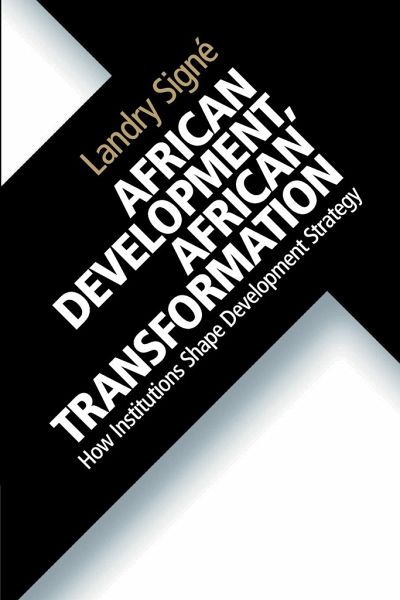Landry Signé
Broschiertes Buch
African Development, African Transformation
Versandkostenfrei!
Versandfertig in 1-2 Wochen
Weitere Ausgaben:

PAYBACK Punkte
18 °P sammeln!




A deep insight into the emergence and persistence of new continental development institutions in Africa and their capacity to affect development outcomes.
Landry Signé is a David M. Rubenstein Fellow at the Global Economy and Development and Africa Growth Initiative at the Brookings Institution, Distinguished Fellow at Stanford University's Center for African Studies, Andrew Carnegie Fellow, Chairman of the Global Network for Africa's Prosperity, Professor and Senior Adviser to the Chancellor at UAA, Special Adviser to Global Leaders, and was a Woodrow Wilson Center Public Policy Fellow, and Visiting Scholar at the University of Oxford. He is the author of numerous key publications in the political economy of development with a focus on Africa and has a special interest in the politics of economic reform, regional integration, institutional change, business in emerging and frontier markets, global political economy, governance, state capacity and fragility, political regimes, public service delivery and the fourth industrial revolution. He is the recipient of more than sixty awards and recognitions from four continents. He has been recognized as a World Economic Forum Young Global Leader for '¿nding innovative solutions to some of the world's most pressing issues', as an Archbishop Desmond Tutu Fellow who 'drives the transformation of Africa,' and was named one of the 'Top 10 Outstanding Young Persons in the World.' He has authored numerous key publications, including Innovating Development Strategies in Africa (Cambridge, 2017). His work has appeared in The New York Times, The Washington Post, Foreign Affairs, and Harvard International Review.
Produktdetails
- Verlag: Cambridge University Press
- Seitenzahl: 222
- Erscheinungstermin: 22. März 2019
- Englisch
- Abmessung: 229mm x 152mm x 12mm
- Gewicht: 329g
- ISBN-13: 9781108456203
- ISBN-10: 1108456200
- Artikelnr.: 53936129
Herstellerkennzeichnung
Libri GmbH
Europaallee 1
36244 Bad Hersfeld
gpsr@libri.de
Für dieses Produkt wurde noch keine Bewertung abgegeben. Wir würden uns sehr freuen, wenn du die erste Bewertung schreibst!
Eine Bewertung schreiben
Eine Bewertung schreiben
Andere Kunden interessierten sich für













